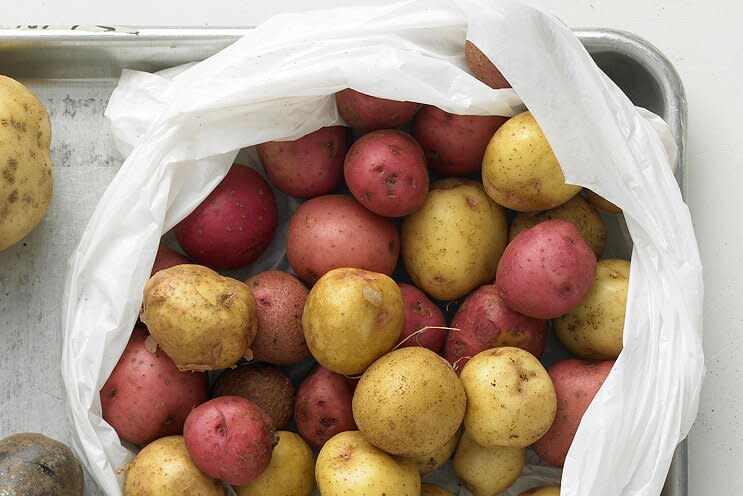How to Store Potatoes the Right Way—and Prevent Them From Sprouting

TABLE OF CONTENTS
On This Page
Where and How to Store Potatoes
Never Store in Fridge
Storing Cut Potatoes
Storing Cooked Potatoes
Signs of Spoilage
There are few foods more versatile than potatoes. They can be mashed, smashed, fried, boiled, or roasted to crispy perfection. The tasty tuber can also be eaten as a side dish (like salad), as a comforting snack (like French fries), or enjoyed as the main affair (like gnocchi). So you can best enjoy all these potato dishes, it's essential to store spuds correctly for optimal freshness and flavor.
Related: Should You Refrigerate Bananas?
How to Store Potatoes
When it comes to proper potato storage, there are several factors to consider: light, temperature, airflow, and the produce they should not be stored with. The best place to store potatoes at home is in a dark pantry or basement, if you have one. In these locations, potatoes will last for several months, according to Ann Ziata, chef and cooking teacher at the Institute of Culinary Education.
Light
A dark spot, like a pantry or basement, means potatoes will not be exposed to light. Light will make the skin of potatoes turn green, says Ziata. Green parts of potatoes will taste bitter and are unsafe to eat, so discard any potatoes with green areas that are widespread or extend deeper than the skin, she says. (If the green areas are small and don't go beneath the skin, you can remove them and safely eat remaining potato, she says.)
Temperature
Temperature is also an important factor, as the tubers keep best in environments between 45 to 50 degrees. But if they're stored at a too-cool temperature (below 42 degrees), the starch in the potatoes will convert to sugar, negatively affecting taste and cooking performance, says Jamey Higham, president of the Idaho Potato Commission. On the other hand, if they're stored above 55 degrees, potatoes will quickly dehydrate, which can potentially cause them to sprout.
Ventiliation
Storing potatoes the right way requires proper ventilation. Ziata recommends open containers (like open paper bags, baskets, and sacks), as these options will prevent excess moisture from accumulating. "Avoid airtight containers and sealed plastic bags, and never wash your potatoes before storing," she says.
Why shouldn't you wash potatoes until you use them? Doing so will increase the risk of fungal or bacterial growth, says Traci Weintraub, chef and founder of Gracefully Fed, a meal delivery service and restaurant in Los Angeles.
Store Them Away From Onions
It's recommended to store potatoes away from onions, which give off ethylene that can encourage sprouting in potatoes, explains Ziata. Additionally, "storing them together can cause your potatoes to take on the flavors of onions, which may not be desirable depending on what you're making with the potatoes," says Weintraub.
Never Store Potatoes in the Refrigerator
While raw, uncut potatoes benefit from cool temperatures, that does not include refrigeration, says Weintraub. As mentioned, low temperatures (like those in a fridge) can turn the potato's starches into sugars, a process known as cold-induced sweetening. This will cause the spuds to develop a dark discoloration when cooked. They'll also produce higher levels of acrylamide, a carcinogenic substance, according to the Food and Drug Administration. Refrigeration can also make potatoes spoil in just a few weeks, notes Higham.
How to Store Cut Potatoes
The exception to the "no refrigeration" rule is if your potatoes are already peeled and cut. In this case, submerge the potatoes in a bowl of cool water, making sure they're completely covered. Store them in the refrigerator and use within 24 hours, says Weintraub. But consider this as a last resort. For maximum freshness and quality, it's best to prepare your potatoes only if you're ready to cook, she says.
How to Store Cooked Potatoes
Cooked potatoes of any kind should be stored like any other cooked food. According to the United States Department of Agriculture, this means keeping them in an airtight container in the refrigerator. Enjoy the leftovers within three to four days and be sure to reheat them thoroughly.
Signs Potatoes Have Gone Bad
According to Ziata, potatoes should feel mostly firm and smell lightly nutty and earthy. With that in mind, if your spuds are overly soft, shriveled, or smell musty, toss them. Remove any green spots or sprouts, as well as black spots (a sign of bruising) inside the potato. "The bruises are not harmful, but I still recommend removing them [as it can compromise the potato's] texture, flavor, and color," says Ziata.

